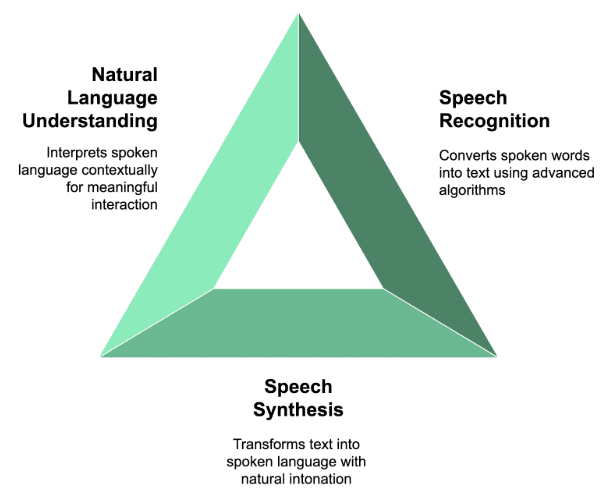Operations management involves a lot of different processes that are all meant to set ways to work smarter and more efficiently. This can be anything from managing inventory, planning shipments, and taking care of orders.
Up until recently, many of these operations were done manually, but here’s the thing: today’s business world is like a high-speed rollercoaster. Companies are dealing with global competition, lightning-fast market changes, and customers who want everything yesterday. With new technologies like artificial intelligence (AI), companies can optimize operations management to achieve meaningful digital transformation in operations management.
In this post we will take a more detailed look into the effect of AI in operations management, including how it can be applied, the role of speech AI, and how platforms like aiOla are making teams more agile and resilient.
Understanding AI in Operations Management
Powered by technologies like machine learning (ML), deep learning, and natural language processing (NLP), AI seeks to help machines perform tasks that usually require human intelligence. When it comes to operations management, AI can be applied in a few different ways. Here’s a quick look:
- Machine learning can help teams optimize inventory levels and predict equipment malfunctions before they occur by assessing patterns and historical data
- NLP can assist in automating customer support inquiries to reduce the burden on agents and direct customers to the right department
- Deep learning can enhance quality control processes by identifying product defects that can be difficult to catch
By boosting efficiency and automating repetitive tasks, AI can improve productivity in operational workflows while also providing real-time insights and cutting costs by reducing errors and downtime.
Applications of AI in Operations Management
AI isn’t only used for automation in operations management to handle repetitive tasks, but through digital operations transformation and adopting new systems, its role is also to make the most of smart systems that can adapt to challenges as they arise. There are several powerful ways AI is being used to help businesses work more productively. Here are some key examples:
- Predictive maintenance: Imagine knowing when your equipment is likely to fail before it actually does. AI can help teams fix issues before they turn into costly breakdowns, saving both time and money
- Demand forecasting: AI dives into historical sales data and market trends to predict customer demand more accurately, which means businesses can plan their resources and inventory way better and reduce forecasting errors by up to 50%
- Quality control: With the help of computer vision cameras and AI sensors, spotting product defects is faster and more precisely than the human eye alone
- Supply chain optimization: AI analyzes everything from shipping routes to supplier performance, figuring out the most efficient ways to get products from point A to point B
- Inventory management: Remove the guesswork with AI as it continuously analyzes sales data, lead times, and customer behavior to ensure you always have the right amount of stock on hand
Operations professionals see AI implementation as a long game with far-reaching benefits. According to a survey, aside from the applications mentioned above, 55% of operations professionals believe AI can help companies reach objectives more effectively than traditional methods. Integrating these new tools into your operations isn’t just a matter of boosting efficiency, but will eventually allow your business to grow and develop beyond what is possible with traditional methods alone.

How Does Speech AI Fit Into Operations Management?
Speech AI is a branch of AI that’s focused on generating and understanding human speech. It incorporates a lot of different processes and technologies, such as:
- Speech recognition to convert spoken words into text
- Speech synthesis to turn text into spoken language
- Natural language understanding to make sense of what’s said in context
In other words, speech AI gives computers the ability to not only listen to what’s being said but understand it and respond as well.
In operations management, speech AI has a range of different applications. For example, workers can use voice commands to update inventory counts, lot maintenance reports, or check the status of delivered orders entirely hands-free. Not only does this help save time, but it can also make workflows safer by keeping employees focused on the tasks they’re working on instead of distractions like paperwork or typing on devices.
Speech AI brings with it a wealth of benefits, from its ability to streamline and automate workflows, deliver real-time data and updates, or trigger actions based on speech alone. All of this works together to make operations a lot smoother and simpler. For frontline workflows, speech AI can go a long way in speeding up tasks like order picking and timely maintenance checks.
Think of a speech AI system as a voice-activated assistant, helping workers get things done as they go and keeping workflows flowing smoothly!
aiOla Speech AI and Frontline Workflow Automation
Ensuring that frontline workers have all the tools at their disposal to execute their jobs is critical since a bottleneck at the frontline can create delays in all your business processes. With speech AI technology like aiOla, you can feel confident that your frontline workforce is operating as smoothly as possible.
aiOla makes it easy to automate routine tasks using speech alone. Thanks to a system that uses a mix of different technologies like automatic speech recognition (ASR) and natural language understanding (NLU), aiOla is able to understand over 120 different languages as well as different accents, dialects, and industry jargon. So no matter what your team is working on, critical operations can be streamlined easily and quickly through speech alone.
Here’s how aiOla is helping real-world frontline workers:
- Reduce inspection time by completing them by speaking
- Accurately report and retrieve data in real-time
- Generate reports based on speech data for deep insights into business processes
- Enhance safety and compliance by relying on voice rather than manual operations
To better illustrate the impact aiOla can have on frontline workflows, let’s take a look at an example. A Fortune 200 beverage company was looking for a way to improve communication between team members so they could alert each other about issues like missing forklifts, incomplete orders, or inventory issues. Using aiOla’s speech-powered AI, the company’s frontline workers were able to continue their usual operations while updating each other by speech so all team members received immediate real-time alerts. As a result, the company increased pallets per hour by 25% and reduced its incident resolution time by 60%.
Embracing AI in Operations Management
Implementing AI in your company isn’t only going to make your operations smoother, it’s also going to help future-proof your business. By having AI tackle repetitive and manual tasks, your employees are more free to innovate and get creative. It will also help you meet market demands and stay competitive. With technologies like aiOla at the forefront of speech AI, your team can harness the power of speech and turn it into action for stronger artificial intelligence operations and empowered frontline workers.








